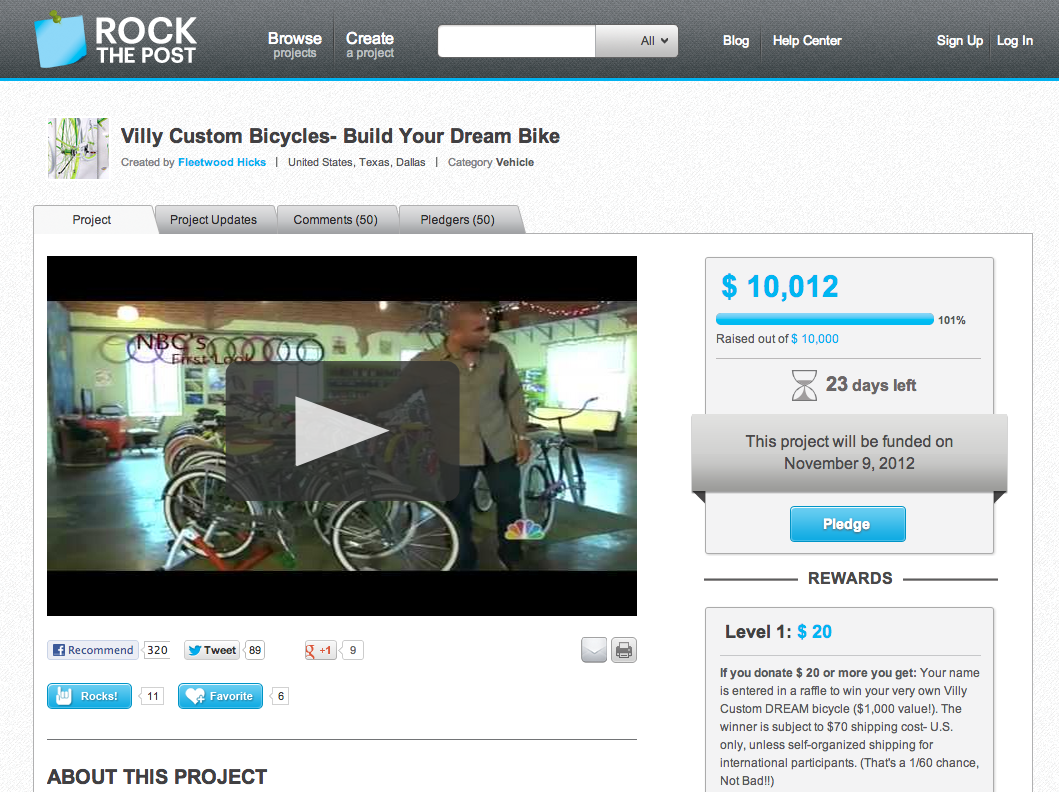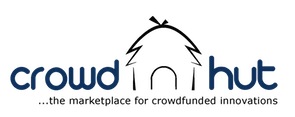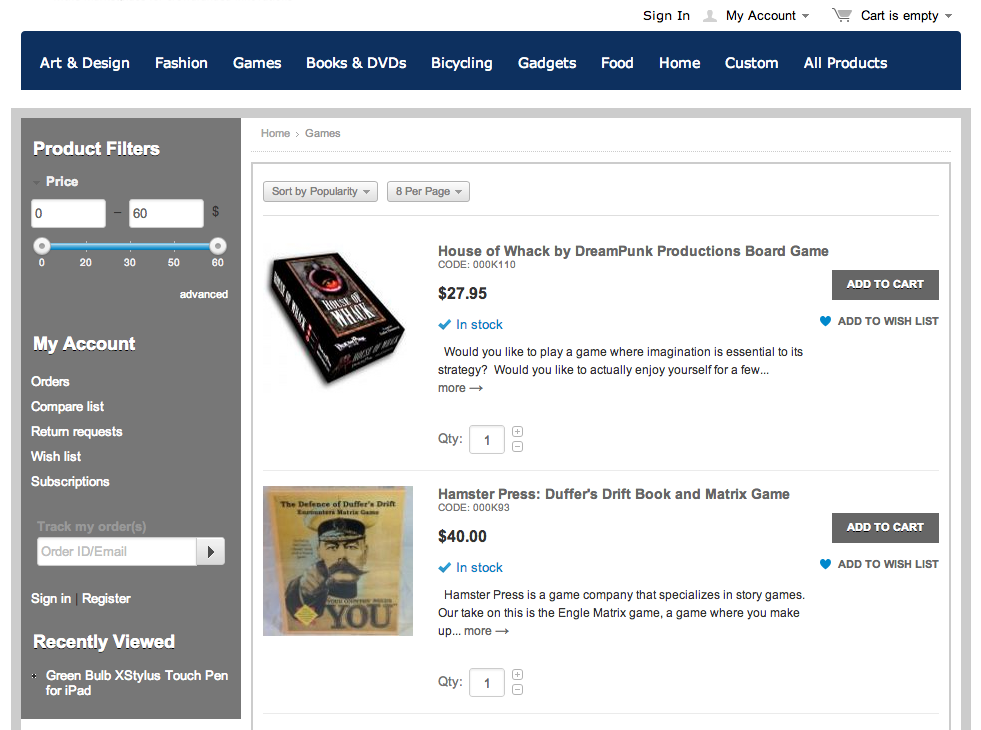Entrepreneurship is one of the few non-partisan issues these days. As a potential engine of job creation, both sides tend to idealize startups and SMBs as the cure-all for a laconic economy and unemployment. Of course, to grow and create those jobs, startups need capital. And traditionally, the businesses that can’t or won’t raise venture capital turn to banks, commercial lenders, and other sources to fund their operations. However, with the credit crunch, SMBs were forced to turn to other alternatives. Namely, crowdfunding sites.
The passage of the JOBS Act earlier this year cemented that not just in practice, but in policy. As a result, it’s been a huge year for crowdfunding platforms — especially Kickstarter, which has raised $50 million for games alone in 2012. But with the increased attention, we’ve started to spy potential holes in the crowdfunding model.
Two problems in particular stand out and two startups are trying to solve them: Crowdfunding platform Rock The Post limits its projects to those created by legitimate entrepreneurs and SMBs to reduce risk for backers and provides tons of hands-on help during the funding process to help project creators increase their chances of being funded. And CrowdHut is, among other things, helping entrepreneurs tackle the challenge of what to do once they’ve been funded and have 10,000 orders staring them in the face.
They’re two equally significant problems for crowdfunding platforms, and while the two startups may not be the next Google, they represent an important and necessary step forward for the space in terms of how it handles both those who seek funding for their ideas, and those who dish it out.
Rock The Post
Two big complaints often hurled at Kickstarter are that it’s not doing enough to protect the backers (or the customers) of its projects and that it lacks a deep toolset that would allow, for example, creators to manage and gather information on their backers or offer advice/educational info on how to improve the chances of success. At this point, if you actually want to fulfill your orders, you’re going to have to collect the data on your customers yourself. Everything from analytics to processing should be provided to creators to help them optimize the process.
Launched in November last year and backed by $700K in seed funding, Rock The Post takes a page from Fundly’s book and accepts projects for nonprofits and charities that are charged a special fee to participate alongside founders’ projects.
To add a layer of protection for backers, Rock The Post monitors every project submitted to its site, conducting due diligence on creators to verify that they’re nonprofit organizations and ensure that any pledge money goes toward a real cause, for example.
The crowdfunding platform also focuses aggressively on customer service, with its staff personally assisting each project creator (once approved) in the curation and crafting of their campaign. The team offers one-on-one consulting sessions, weekly, personalized email tips, and a variety of educational info, such as tips, guidelines, webinars, and tutorials to increase the potential for success. The platform charges a 5 percent fee for successfully funded projects, which is lower than if one were to use CrowdHut’s services (and the majority of crowdfunding portals).
Rock The Post offers an integrated payments option, so that users can make transactions on the site itself, rather than being directed to a third-party website. Again, the startup’s main value proposition is the degree to which it’s willing to help its project creators reach their funding goals, trying to remove that impersonal air that can infect larger platforms.
As soon as they’re approved, project creators get a call from Rock The Post to ensure they understand and are following the guidelines. The platform also now has editing features built-in so that users can personalize their pages (it also includes “team page management”) and receive tips tailored to where the project is in the fundraising process. On top of that, the startup has a feedback rating system (a la eBay) so that users can learn more about the background of individual project creators.
The goal of Rock The Post is really to only fund the products and ideas that actually have a chance to make a difference in the world, rather than approving any idea that hits their radar. With its “focus on entrepreneurs, not dreamers,” the startup is trying to keep its platform legitimate and help eliminate some of the barriers that typically stand between startups and growth capital.
By closely involving itself in project development and marketing, Rock The Post begins to slip into Quirky territory — the social networking/collaboration suite recently raised $68 million from Andreessen and Kleiner. It’s got Wahooly and Fundable to compete against in the rewards-by-equity space, and it really needs to do more to differentiate its design and user experience. At least superficially, it sure feels a lot like Kickstarter.
In terms of how it will reward its customers, the startup will decide — once the SEC releases its rules and regulations — whether or not it wants to be a purely rewards-based platform, an equity platform, or a hybrid. My guess would be hybrid. Check out the Rock The Post profile below:
CrowdHut
Another related criticism of Kickstarter that’s begun to surface this year is that the company is not taking a strong enough position on accountability. I think that’s a little short-sighted and Kickstarter is between a rock and a hard place on that one, but this fulfillment or follow-through issue is a real problem.
For example, you set out as an entrepreneur to get a few people interested in your next-gen watch, hoping to get funded, build, and take it to market. Then, like Pebble, you raise over $10 million. It’s part joyous, part oh shit.
Now you have to fulfill 70K orders, when only two weeks earlier you may have been flipping burgers. By Kickstarter’s TOU, project creators are legally obligated to follow through, but, a year later, some are still waiting for their shipments to arrive.
In July, we took a deep look at what makes the most successful Kickstarter projects successful and asked what they did wrong, or what they’d change if they did it again. The most common trend to surface: A lack of preparedness among entrepreneurs in terms of hosting, customer interaction, outreach, and CRM — all the way to manufacturing and fulfillment demands.
Philip Reicherz, founder of Magnolia Ventures and the first employee (and later partner) at SecondMarket and Sell Your Stuff founder David Borish started CrowdHut in May to bring a steadier stream of income to product founders by tackling the distribution side of crowdfunding with an e-commerce platform and affiliate marketing program.
Since then, CrowdHut has expanded its scope to include this specific use case I mentioned before. Co-founder and CTO David Borish explains to Crowdsourcing.org:
One of the things we learned over the last three months, since we started this venture, was that there is a much bigger need [to help] those entrepreneurs that are funded, but prior to actually having the product being sold … There are a number of concerns in the crowdfunding industry about products that have not been able to make their projected deadlines. Our focus is building the advisory team to [also] help those products that are funded and need assistance prior to actually having a product that’s ready for market.
So, CrowdHut is addressing this problem by offering a searchable e-commerce platform (which launched with 50 vendors and 100 products), product fulfillment and marketing services, and a team of eight expert advisors who specialize in everything from retail and direct response advertising to patents. The idea is to help entrepreneurs (who have their projects funded but no go-to-market strategy) find supplementary forms of distribution for their products and go to market in style.
In addition, CrowdHut also launched today an affiliate marketing platform, which allows bloggers, media types, influencers, etc. to earn a 10 percent commission for promoting the products. Bloggers love revenue shares.
CrowdHut, which provides payment processing, return and restock, affiliate marketing, advertising, and distribution, takes 30 percent of successful sales. It may seem steep for first-time crowdfunding entrepreneurs, but there’s plenty of benefit for those with small teams that don’t have the resources to handle the ins and outs of marketing, distribution, and processing.
It’s easy to see the value of a services layer emerging around crowdfunding sites. However, at this point, CrowdHut is just in stage one. Entrepreneurs may be looking for a use case in which they get all the stuff mentioned above, while also being able to rely on the platform to take care of every link in the product fulfillment chain. CrowdHut isn’t doing this yet, but I wouldn’t be surprised if this made it into a future iteration.
Photo (CC-BY): James Cridland




